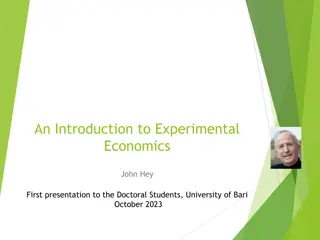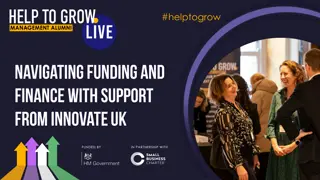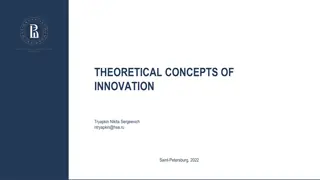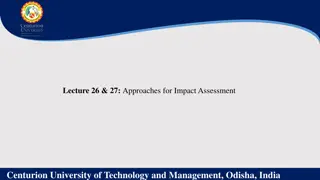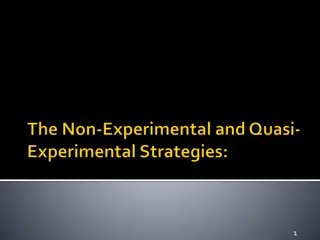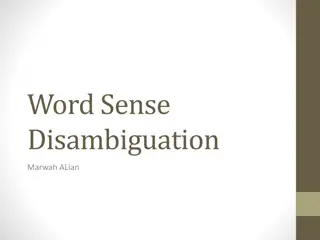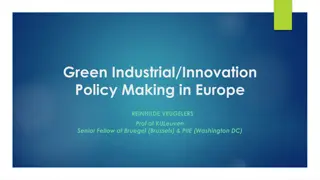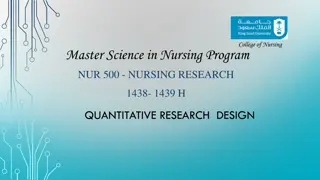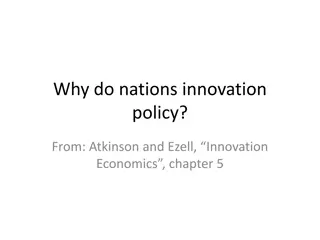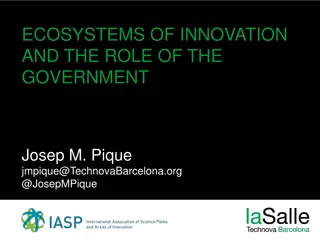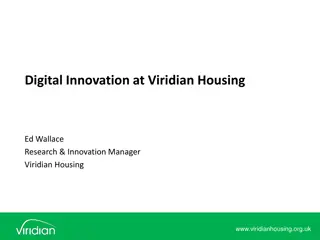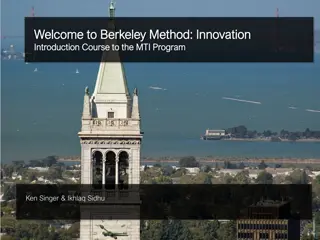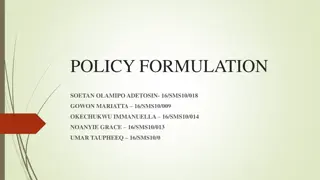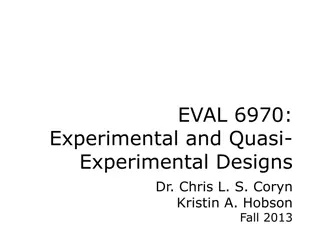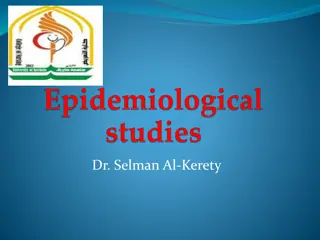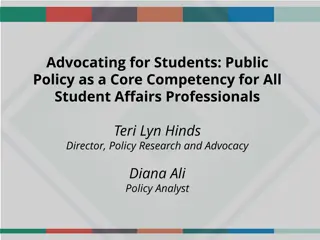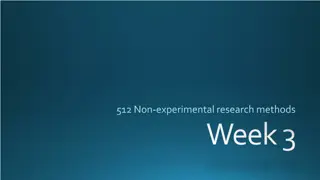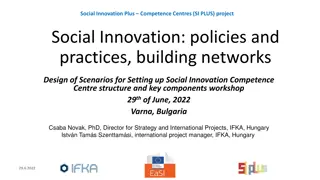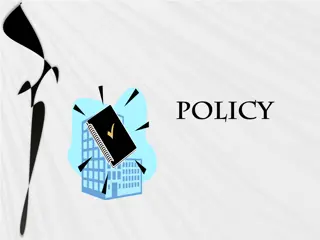Policy Innovation Through Experimental Approaches
This content discusses modes of experimental policy engagement, policy design experiments, creating experimental spaces, supporting and evaluating experiments, experimental governance, and the role of experimentation in policy formulation. It also explores methods and approaches used in TIPC member countries to conduct experiments, common themes in experimental approaches, and an example experiment in Colombia involving challenge-led grants.
Download Presentation

Please find below an Image/Link to download the presentation.
The content on the website is provided AS IS for your information and personal use only. It may not be sold, licensed, or shared on other websites without obtaining consent from the author.If you encounter any issues during the download, it is possible that the publisher has removed the file from their server.
You are allowed to download the files provided on this website for personal or commercial use, subject to the condition that they are used lawfully. All files are the property of their respective owners.
The content on the website is provided AS IS for your information and personal use only. It may not be sold, licensed, or shared on other websites without obtaining consent from the author.
E N D
Presentation Transcript
TIPC experimentation member country experiences Paula Kivimaa, Senior Research Fellow, SPRU Johan Schot, Director, SPRU Jonas Torrens, Research Fellow, SPRU TIPC Engagement Week #TIPC2018Conf 2
Modes of Experimental policy engagement Policy design experiments Policy instrument & policy process experiments Creating experimental spaces Supporting, connecting, evaluating experiments Experimental governance / cultures Role of experimentation in policy Assists in the formulation, calibration and justification of policy instruments Setting up of specific experimental policy interventions (new policy instruments, policy processes) temporally or in a small scale. Creates dedicated environments & constituency for experimentation, where normal conditions (e.g. regarding permits, taxation) are relaxed. Articulates existing experiments carried out by multiple actors, facilitates learning from & between experiments, and supports networking Creates flexible & proactive gov. arrangements, inc. open-ended goals, allowing decentralised & experimental interventions by multiple actors. Actors involved Policymakers, recipients Policymakers and analysts, stakeholders involved Lead users, entrepreneurs, designers, civil society, policymakers Living Labs, Transition Management, innovation platforms Networks implicated in experiments, intermediaries & policymakers Aim at broadening participation to actors normally excluded Approaches Randomised Control Trial, Behavioural Experiments Policy innovation Strategic Niche Management, also Transition Management Adaptive & Reflexive Governance ideas Under development 3
Methods & approach Experiences from TIPC member countries Survey on experimentation in member countries Content here in one or two columns in August 2018 In-depth interviews with member representatives in September 2018 Summary of common themes/concerns and presentation of example experiments Content here in one or two columns TIPC Engagement Week #TIPC2018Conf 4
Themes for experimental approaches Experiences from TIPC member countries Shared between two or more members: digital life Content here in one or two columns circular economy peace, sustainable and inclusive communities Only mentioned by one member: empowering local producers youth Content here in one or two columns TIPC Engagement Week #TIPC2018Conf 5
Experiment example Colombia Challenge-led grants (combined with internal workshops for design and monitoring) that include a differentiated perspective about the role of STI in transformations, and involve new actors. E.g. Call for proposals for peace and sustainable communities. Transformation aims : Addressing the needs of communities (e.g. water, energy) in areas of conflict; involving community actors Problems: Strong divide between experimental activities and traditional role of the agency (i.e. conventional programmes); bureaucratic demands of compliance (ISO certificate) resulting in a format of conventional call Embedding: Link to broader challenges of peace building; at present no obvious link between the levels and mechanism for learning (pos. involvement of UNDP) TIPC Engagement Week #TIPC2018Conf 6
Experiment example Finland Transformation aims : improved democracy, innovation, better public services Experimental culture power team in prime minister s office creating support for small experiments (funding, digital tools) Problems: lack of courage among civil servants, especially in cross- domain issues Embedding: small experiments but multiplied effects possible through gradual cultural change Role for the public sector: an enabler of innovation and removing barriers TIPC Engagement Week #TIPC2018Conf 7
Experiment example Mexico Transformation aims : Initiate and support a collective learning & capability building process; participation of all related key actors Embedding: no established approached at present Challenge-oriented calls not constrained by traditional institutions/regulations. Two-step approach of FOMIX: (1) state gov., civil society, researchers bring ideas that CONACYT processes to better understand the problem (challenge), & define a call for proposals. (2) projects funded given space to further explore the problems before implementation Role for the public sector: Promoter/motivator for local govs to fund, for multidisciplinary/multi-sector collaboration Problems: Resistance; participation of local governments to new way of working; few unconventional actors involved in the projects TIPC Engagement Week #TIPC2018Conf 8
Experiment example Norway Responsible Research and Innovation framework revision, between RCN and researchers Transformation aims : processes in RI system to be anticipatory (not describing impact), reflexive, inclusive and responsive Embedding: more pilots different contexts, stakeholders, research disciplines Problems: Professional/ institutional identities, competition, not seeing benefits cross- disciplinary/sectoral collaboration Role for the public sector: Societal actor /change maker not only by design TIPC Engagement Week #TIPC2018Conf 9
Experiment example South Africa Transformation aims : addressing wicked problems & lock-ins at system level, aiming for visionary (rather than specific) outcomes, capacity building Living Labs project, creating an open innovation platform enabling co-creation, esp. in ICT related products Problems: Literacy, particularly computer literacy Embedding: idea to scale-up through the education system Role for the public sector: capacity building, funding and experimentation TIPC Engagement Week #TIPC2018Conf 10
Experiment example Sweden Transformation aims : create space in regulation (e.g. safety laws, or tax law) for radical innovations Policy labs Space to meet and discuss issues in informal setting. Actors can learn about their possible roles in innovation Problems: lack of interest, and understanding Embedding: work across various ministries and agencies, taking away barriers Role for the public sector: innovate on its regulation; create spaces for experimentation TIPC Engagement Week #TIPC2018Conf 11
Illustrations of experimentation Based on experiences from TIPC member countries From experiments by necessity (scarcity of funds) to experimental culture: different experiences in different Content here in one or two columns TIPC member countries 1. Experimentation taken up through new forms of challenge- led research and innovation funding (involving policy instrument or process experimentation) 2. Support for experimentation by allowing spaces outside formal rules and procedures (i.e. informal opening up of experimental culture, policy/living labs) 3. Formalisation of experimental culture via legitimising it through policy strategies, changes in rules and structures Content here in one or two columns TIPC Engagement Week #TIPC2018Conf 12
Common issues & interests Based on experiences from TIPC member countries Overcoming legal and organisational barriers Content here in one or two columns Use of policy/living labs Evaluation of experiments, indicators Learning why things don t or do work Role of researchers as parts of system Content here in one or two columns TIPC Engagement Week #TIPC2018Conf 13
Broader issues to be addressed In support of advancing TIP experimentation Limited scope within one funding agency to achieve experimentation in TIP sense, needs collaboration across different government actors Content here in one or two columns Existing regulatory and institutional structure favours traditional RDI funding formats, and requires alternative solutions E.g. other agencies/entities taking on experimentation instead of primary STI policy actor; how to facilitate broader visioning, networking and learning? Moving away from requirements pertaining to specific outcomes/deliverables to transformative solutions/outcomes and acceptance of higher risk of failure E.g. the outcomes may not be upscalable but change can be achieved through other forms of embedding; replication, institutionalisation, circulation of knowledge (cf. Turnheim, Kivimaa, Berkhout, 2018) Content here in one or two columns TIPC Engagement Week #TIPC2018Conf 14
Conclusions There is variety of experimentation in member countries (all forms detected to a degree), but it is still ad hoc and not very common Content here in one or two columns Some transformation-related aims identified, but experimentation is not framed in terms of sustainablesocio-technical transformation Content here in one or two columns Even when transformation is alluded to, evaluation of transformation is not usually built in Scope for TIPC to strengthen these aspects! TIPC Engagement Week #TIPC2018Conf 15


